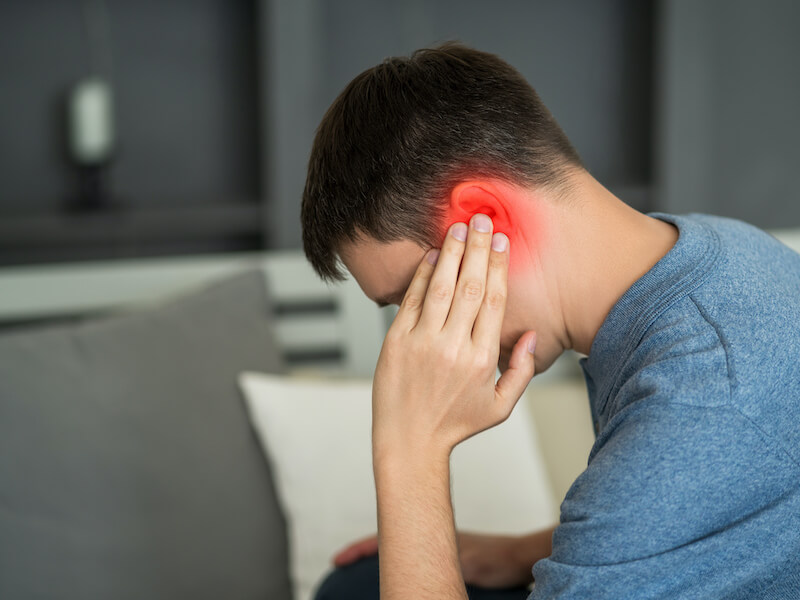Let’s pretend you go to a rock concert. You’re cool, so you spend all night in the front row. It’s not exactly hearing-healthy, but it’s fun–and the next day, you wake up with two ringing ears. (That part’s less fun.)
But what if you wake up and can only hear out of one ear? Well, if that’s the case, the rock concert may not be the culprit. Something else might be at work. And when you experience hearing loss in one ear only… you might feel a little alarmed!
What’s more–your hearing might also be a little wonky. Your brain is used to sorting out signals from two ears. So only getting information from a single ear can be disorienting.
Why hearing loss in one ear causes problems
Your ears generally work in concert (no pun intended) with each other. Just like having two forward facing eyes helps you with depth perception and visual acuity, having two outward facing ears helps you hear more accurately. So when one of your ears stops working properly, havoc can result. Among the most prominent impacts are the following:
- You can have trouble pinpointing the direction of sounds: Someone calls your name, but you have no idea where they are! When your hearing goes out in one ear, it’s really challenging for your brain to triangulate the source of sounds.
- It’s hard to hear in noisy places: With only one functioning ear, noisy spaces like restaurants or event venues can suddenly become overwhelming. That’s because your ears can’t make heads or tails of where any of that sound is coming from.
- You have trouble discerning volume: Just like you need both ears to triangulate location, you kind of need both ears to figure out how loud something is. Think about it this way: if you can’t figure out where a sound is coming from, it’s impossible to know whether that sound is quiet or just away.
- Your brain gets tired: When you lose hearing in one of your ears, your brain can get extra tired, extra fast. That’s because it’s trying desperately to compensate for the lack of hearing from one of your ears. This is especially true when hearing loss in one ear suddenly occurs. This can make all kinds of tasks throughout your day to day life more taxing.
So what causes hearing loss in one ear?
Hearing specialists call muffled hearing in one ear “unilateral hearing loss” or “single-sided hearing loss.” While the more typical kind of hearing loss (in both ears) is usually the result of noise-related damage, single-sided hearing loss is not. This means that it’s time to look at other possible causes.
Some of the most common causes include the following:
- Earwax: Yup, sometimes your earwax can become so packed in there that it cuts off your hearing. It’s like wearing an earplug. If this is the case, do not reach for a cotton swab. A cotton swab can just create a bigger and more entrenched problem.
- Ear infections: Infections of the ear can cause swelling. And this swelling can close up your ear canal, making it impossible for you to hear.
- Ruptured eardrum: Usually, a ruptured eardrum is hard to miss. It can be caused by head trauma, loud noises, or foreign objects in the ear (among other things). And it occurs when a hole is created between the thin membrane that separates your ear canal and middle ear. The result can be quite painful–and usually causes tinnitus or hearing loss in that ear.
- Meniere’s Disease: Meniere’s Disease is a degenerative hearing condition that can cause vertigo and hearing loss. Often, the disease progresses asymmetrically: one ear may be impacted before the other. Hearing loss in one ear with ringing is another common symptom of Meniere’s Disease.
- Abnormal Bone Growth: In very rare cases, the cause of your hearing loss might actually be some atypical bone growth getting in the way. And when it grows in a certain way, this bone can actually interfere with your hearing.
- Acoustic Neuroma: While the name might sound pretty intimidating, an acoustic neuroma is a benign tumor that grows on the nerves of the inner ear. While it’s not cancerous, necessarily, an acoustic neuroma is still a serious (and possibly life-threatening) condition that you should talk to your provider about.
- Other infectionsOne of your body’s most common reactions to an infection is to swell up. It’s just what your body does! This reaction isn’t always localized, so any infection that causes inflammation can result in the loss of hearing in one ear.
So… What do I do about my single-sided hearing loss?
Treatments for single-sided hearing loss will vary depending on the root cause. In the case of certain obstructions (such as bone or tissue growths), surgery may be the ideal option. Some issues, like a ruptured eardrum, will usually heal on their own. And still others, such as an earwax based obstruction, can be cleared away by simple instruments.
In some cases, however, your single-sided hearing loss may be permanent. And in these cases, your hearing specialist will help by prescribing one of two hearing aid options:
- CROS Hearing Aid: This unique type of hearing aid is designed specifically for people with single-sided hearing loss. These hearing aids can detect sounds from your impacted ear and transfer them to your brain via your good ear. It’s very complicated, very cool, and very effective.
- Bone-Conduction Hearing Aids: To help you compensate for being able to hear from only one ear, these hearing aids use your bones to conduct the sound waves to your brain, bypassing much of the ear altogether.
It all starts with your hearing specialist
If you aren’t hearing out of both of your ears, there’s likely a reason. In other words, this is not a symptom you should be ignoring. It’s important–both for your wellness and for your hearing health–to get to the bottom of those causes. So schedule a visit with your hearing specialist today–so you can start hearing out of both ears again!
Find a provider in your area to schedule an appointment by searching providers near you.



